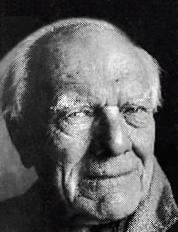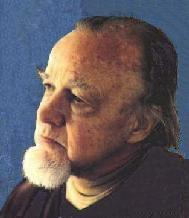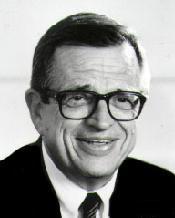|
Gerrit C. Berkouwer
(1903- )
 Berkouwer's
major works or writings: Berkouwer's
major works or writings:
Faith and Justification
(1949)
Studies in Dogmatics(1952)
Heilige Schrift(1966-67)
(Holy Scripture) (1975)
 Malcolm
Muggeridge (1903-1990) Malcolm
Muggeridge (1903-1990)
 Muggeridge's
major works or writings: Muggeridge's
major works or writings:
A Third Testament
(1976)
The End of Christendom
Vintage Muggeridge
(1985)
Austin Farrer
English
 Farrer's
major works or writings: Farrer's
major works or writings:
Faith and Speculation
(1967)
Lesslie Newbigin
 Newbigin's
major works or writings: Newbigin's
major works or writings:
The Open Secret
(1978) (critical of universalism)
Helmut Thielicke
(1908- )
Applied Christianity: ethics driven
by a transformed Christian life; evangelical zeal shaped by an understanding
of the need to contemporize the message to reach the people
 Thielicke's
major works or writings: Thielicke's
major works or writings:
Theological Ethics
(1955)
The Evangelical Faith
(1968-1978)
Francis
Schaeffer (1912-1984)

Schaeffer was born into a family with
no strong religious interests--but himself underwent a religious conversion
at an early age. Later--especially under the urging of his determined young
wife, Edith--he entered Westminster Seminary, the conservative breakaway
Presbyterian seminary in Philadelphia. He pastored conservative Presbyterian
Churches--until after World War Two when he was sent as a missionary to
develop Christian youth programming in Europe. Eventually he continued
that work under his own auspices.
Schaeffer was a strong individualist
who approached Christianity from the vantagepoint that it alone truly had
the answers to the kinds of questions that modern culture raises--the existence
of God in a materialistic universe, the humanity of man in a mechanistic
culture. His individualism was particularly pronounced in the format
by which he presented his thoughts--in his own living room before a group
of young, usually college-age guests, at the family chalet in Switzerland
called L'abri (the Shelter).
But his discussions became widely
recognized as insightful--and when in 1960 Time magazine wrote about
this strange miniature seminary at home, he came into international notice.
Then in 1968, when he was 56 years old, his first book was published from
a series of lectures he presented at Wheaton College. From then on
the published work began to come forth in great quantities.
Finally, he put his challenge to
late-modern Western culture before his audience in the form of a movie,
produced in the period 1976-1977 by his son Franky from Francis' book How
Shall We Then Live? This was followed up in 1979 with another
film, Whatever Happened to the Human Race?, again produced by son
Franky--in cooperation with C. Everett Koop. The subject here was
abortion--and was a strong indictment of the way in which modern life dehumanizes
humanity. Though the second effort seemed not to draw audiences, which
was a big disappointment to Schaeffer, in fact it probably had a greater
impact on shaping the direction of Evangelical Christianity than the earlier
effort.
In the late 1970s it was discovered
that Schaeffer had cancer--and he battled it off and on until it took his
life in 1984.
 Schaeffer's
major works or writings: Schaeffer's
major works or writings:
The God Who Is There
(1968)
Escape from Reason
(1968)
He Is There and He Is Not
Silent (1972)
How Should We Then Live?
(1976)
Whatever Happened to the Human
Race? (1979)
A Christian Manifesto
(1980)
The Great Evangelical
Disaster (1984)
Jürgen Moltmann
(1926- )
 Moltmann's
major works or writings: Moltmann's
major works or writings:
Theology of Hope(1965)
The Crucified God(1972)
The Church in the Power of
the Spirit (1975)
The Trinity and the Kingdom
of God (1980)
Wolfhart Pannenberg
(1928- )
The "Jesus of history" is essential
to the faith--not to be so easily dismissed as Barth and Bultmann do (who
substitute the "Christ of faith" in its place--what Pannenberg calls "Christology
from above"); the resurrection must be understood as an historical event--not
just an event seen only by the eyes of faith. Christian truth is not just
for an in-group of the faithful--but naturally evident for all eyes to
behold, to bring people to faith. Faith certainly takes one beyond the
limitations of the evidence; but the evidence nonetheless is very important
as the grounding for faith. It must not be dismissed. True, the evidence
is not full or complete; this will not come until the end of history. But
God did not leave us without evidence. The testimonies of those who witnessed
the Resurrection of Jesus were given by God to the people as direct proof
or factual evidencethat Jesus indeed was the Christ ("Christology from
below") . The Scriptural accounts of the Resurrection were not just spiritualized
testimonies of faith of the first century believers. The Jesus of the historical
Resurrection is the historical completion of the act of Divine Self-revelation--not
its starting point (i.e., to be completed by faith in the heart of the
believer).
 Pannenberg's
major works or writings: Pannenberg's
major works or writings:
Revelation as History(1961)
Jesus--God and Man
(1964)
Theology and the Philosophy
of Science (1976)
The Church(1983)
Carl Braaten
 Braaten's
major works or writings: Braaten's
major works or writings:
Eschatology and Ethics(1974)
Justification (1990)
John R. W. Stott
 Stott's
major works or writings: Stott's
major works or writings:
Basic Christianity
(1958)
Lausanne Conference
(1974)
 The
major works or writings resulting from the conference: The
major works or writings resulting from the conference:
The Lausanne Covenant
F. F. Bruce
R. C. Sproul
 Sproul's
major works or writings: Sproul's
major works or writings:
The Holiness of God
(1985)
Chosen By God (1986)
Not a Chance: The Myth of
Chance in Modern Science and Cosmology
(1994)
Harvey Cox
 Cox's
major works or writings: Cox's
major works or writings:
Many Mansions
(1988) (critical of universalism)
Religion in the Secular City
Fire from Heaven: The
rise of Pentecostal Spirituality and the Reshaping of Religion in the Twenty-First
Century (1994)
Billy
Graham (1918- )
 Graham was
born on a farm near Charlotte, North Carolina. He underwent a strong
conversion experience at age 16, which set the course of his life from
then on. He undertook studies at at Bob Jones University and the
Florida Bible Institute before being ordained a Southern Baptist
preacher in 1940. He continued his studies at Wheaton College,
Illinois, and graduated in 1943 with a degree in anthropology. He
served as pastor of a Baptist church in Illinois-- before undertaking a
new career as itinerant evangelist. Graham was
born on a farm near Charlotte, North Carolina. He underwent a strong
conversion experience at age 16, which set the course of his life from
then on. He undertook studies at at Bob Jones University and the
Florida Bible Institute before being ordained a Southern Baptist
preacher in 1940. He continued his studies at Wheaton College,
Illinois, and graduated in 1943 with a degree in anthropology. He
served as pastor of a Baptist church in Illinois-- before undertaking a
new career as itinerant evangelist.
In 1949 he
entered the world of big-time evangelism when he preached in Los Angeles
before a gathering of 350,000 people. The following year (1950)
he constituted his new ministry as the Billy Graham Evangelistic Association.
 Graham's
major works or writings: Graham's
major works or writings:
Peace
with God (1952)
World
Aflame (1965)
Just As I Am: The Autobiography
of Billy Graham (1997)
 Chuck
Colson Chuck
Colson
 Colson's
major works or writings: Colson's
major works or writings:
Against the Night
(1989)
The Body (1992)
 James
Dobson James
Dobson
 Dobson's
major works or writings: Dobson's
major works or writings:
Focus on the Family
| 











 Miles
H. Hodges
Miles
H. Hodges